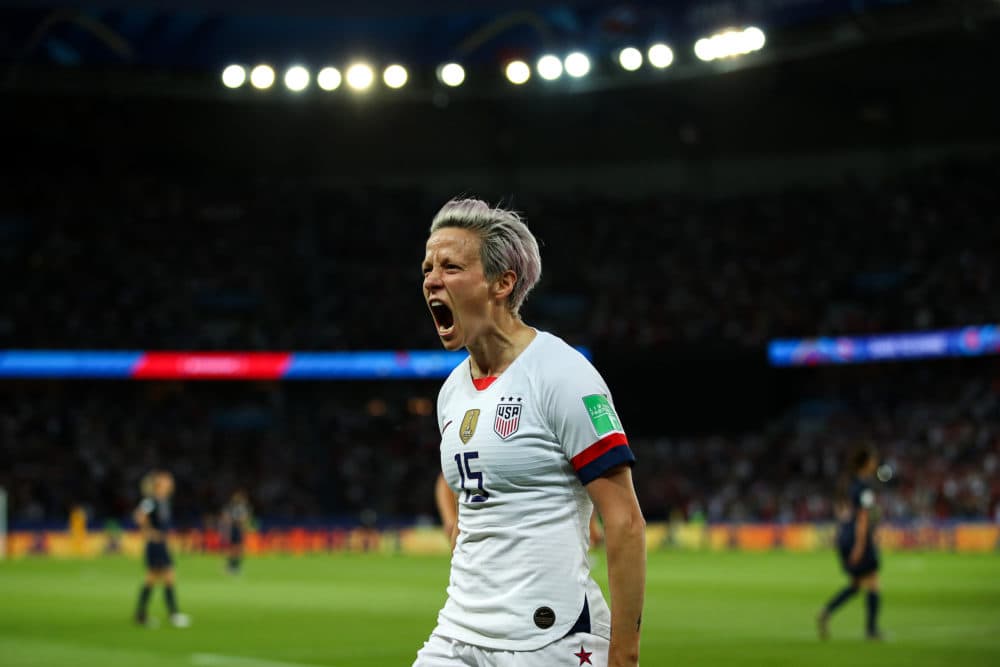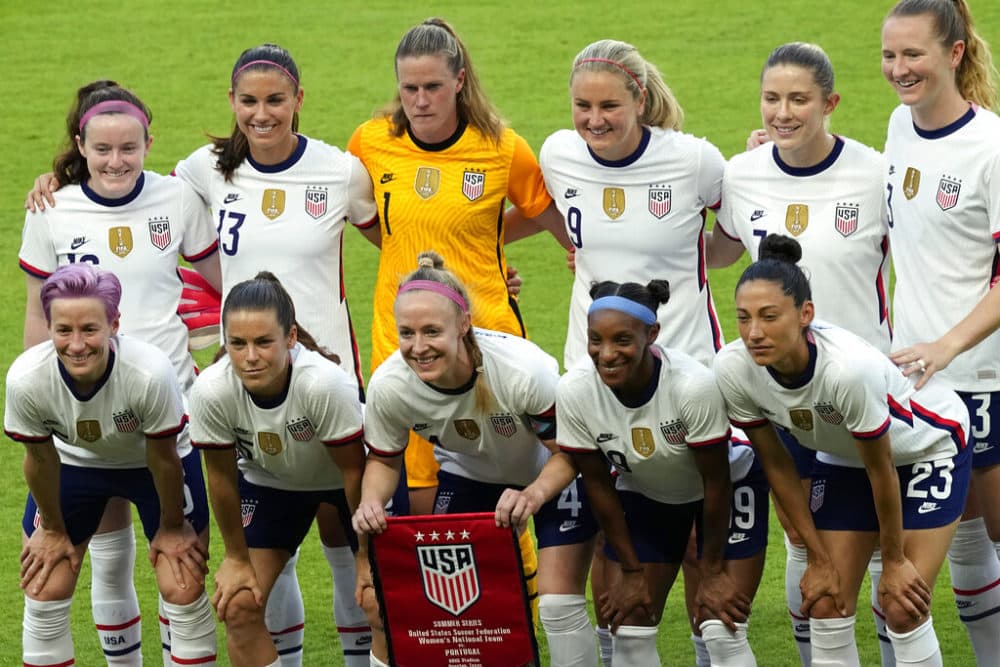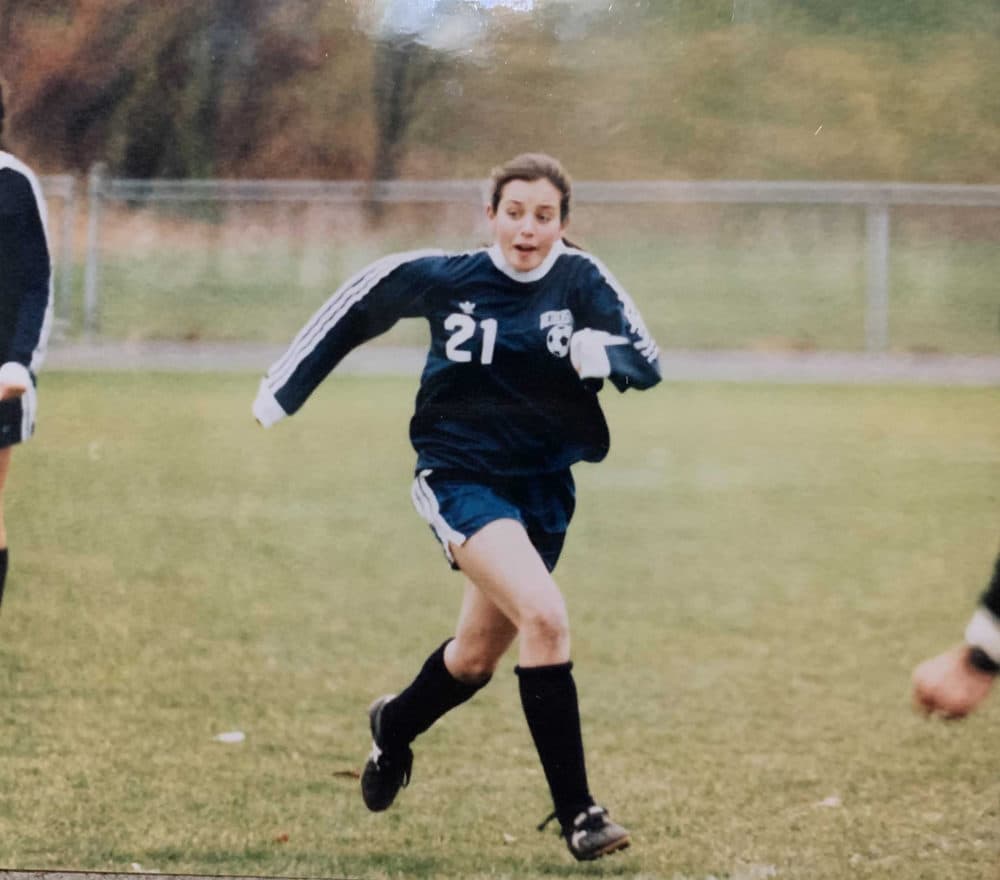Advertisement
Commentary
The U.S. Women's Soccer Team Is All Of Us. Come On, Ladies, 'LFG'

For my birthday this year a friend gave me a pink button with the message: “Carry yourself with the confidence of a mediocre white man.”
It made me laugh because it’s absurd, but also because it’s sadly decent advice. We gals have come a long way in the last 100 years. Women can vote now, we have careers and bank accounts, many of us have access to birth control, but, on average, our society still values the contribution of a mediocre white man more than any woman. Do it better, get paid less – this is a fact of life.
I’ve been thinking about this lately because of the Tokyo Olympics — and more specifically, because of the U.S. Women’s National Soccer Team. Since you’ve likely had other things on your mind during the last 16 months, allow me to summarize: The USWNT are engaged in a years-long suit against their employer for gender discrimination. For decades, they’ve been paid less, received fewer training resources and been allocated fewer marketing funds than the men’s team, because – the players argue — they are women. Now, by taking the extraordinary step to sue the U.S. Soccer Federation, they are asking for equal pay and fair treatment. If they win, it has all the trappings of a landmark case that could help girls and women for years to come. If they lose … I don’t even want to contemplate the consequences.

So far, the federation hasn’t budged much. In fact, U.S. Soccer made wildly misogynistic arguments in legal filings, saying that according to “indisputable science” women are inferior to men and that it requires more “skill” and “responsibility” to play for the men’s team than the women’s. They’ve said this – to great rebuke — despite the women being the more successful program by a longshot and a global beacon for women in sport. (For context: the men’s team failed to qualify for the World Cup tournament in 2018. They also failed to qualify for this year’s Olympics, again. And yet, historically they have been compensated at a comically higher rate.)
There’s an excellent new documentary that chronicles the women’s fight for equal pay. It’s called “LFG” – the “L” stands for “Let’s,” the “F” is for a word I can’t write, the “G” is for “Go”—and it’s worth watching, particularly if you like being simultaneously inspired and enraged. It shows how the women see their fight as an intersectional one, tied to other movements for racial justice and LGBTQI rights.
The film is also the perfect primer for the emotional undercurrent you’ll feel when you tune into matches during the Olympic competition. As is often the case in sport, what you’re watching is much more than a game – for the players and the fans who root for them. It’s unfair, but the U.S. women have to be perfect, again, at the highest levels. U.S. Soccer denied them equal pay after their 2019 World Cup championship (the team’s fourth – a record), but surely they wouldn’t deny them parity after winning Olympic gold? Or would they? That’s what’s at stake. It’s the latest battle in a decades-long feud to prove that women are good enough.
Or at least that’s what it feels like to me. I’ve been a die-hard fan of the USWNT since high school. My hometown was also home to the legendary Tony DiCicco, who coached the women’s team to victory in the 1999 World Cup. I played soccer in high school and college (mostly an outside midfielder). After graduation, I was desperate to work for the women’s first (and ultimately) failed professional league, WUSA. I have no great insight into the beautiful game or any mind for sports marketing. I was drawn to the team, then and now, because of what they represent: a sisterhood of powerful, talented women who are celebrated for their athleticism, strength and mental fortitude.

As girls become women, we’re encouraged to leave that fierce physicality behind. Somehow, the exhilaration of competition gets swapped for something less ferocious, less aggressive, softer. It’s freeing to see these women sprint, thump their chests, yell and slide tackle. I’m not doing much of that anymore, but they are. When I look at my own three little girls, I want them to know their physical power too, and to be able to sustain it. It’s painful to see how reluctant U.S. Soccer is to value its own team of superstars, and how too many people in power are still forcing professional women athletes to choose between their families and their sports.
Of course, the U.S. women’s soccer team is the favorite to win gold – they are the reigning back-to-back world champions – but the competition is stiff. In the first game of group play this week, the USWNT got walloped, losing 3-0 to Sweden. It was their first loss in 44 games, since January 2019, before the last World Cup, before they brought the lawsuit.
In response to the loss, the team’s detractors were predictably awful and snide. Megan Rapinoe, as one of the team’s more outspoken members, is the frequent target of their ire. Imagine that: some people are upset about a confident woman with the audacity to assert herself – how very novel.
If you are continually asked to debate your own worth, do you start to question yourself?
Balancing the pressure that comes with being the world’s best, while bearing the hopes and dreams of an entire gender, while trying to convince the planet you are worthy seems almost unimaginable. Yet, somehow these women are doing it every time they step on the field. I have no doubt: the Sweden game was a hiccup. But it makes me wonder: If you are continually asked to debate your own worth, do you start to question yourself?
I’m not sure. But I can’t stop thinking about something Becky Sauerbrunn, the team captain, said in the film. “Women are brainwashed into having gratitude for what they have,” she said, “but having mentors and other women who open up a new way of viewing things can help to change your mindset.”
The U.S. plays its second game of the Tokyo Olympics on Saturday at 7:30 a.m. EDT.
LFG.

